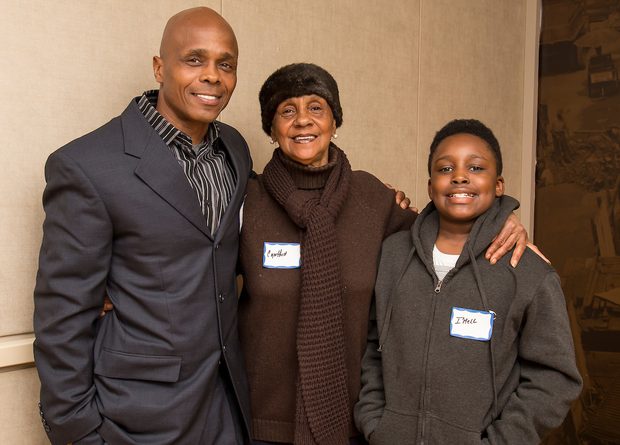Celebrating Reuniting Families, Reigniting Hope
On March 22, families, participants, and partners gathered to applaud the success of NYCHA’s Family Re-entry Program. Launched in November 2013, the Family Re-entry Program (FRP) enables people who have been recently released from incarceration to live with their families in NYCHA developments.
It was a celebration without titles and status, focused on families and second chances. On March 22, families, participants, and partners gathered to applaud the success of NYCHA’s Family Re-entry Program.
Launched in November 2013, the Family Re-entry Program (FRP) enables people who have been recently released from incarceration to live with their families in NYCHA developments. A groundbreaking collaboration between NYCHA, the Vera Institute for Justice, the Corporation for Supportive Housing, and an array of community-based service providers, the program supports individuals who demonstrate motivation to make positive changes in their lives with services including intensive case management. After two successful years, they can be permanently added to their families’ NYCHA leases.
The largest public housing reentry program in North America, NYCHA’s program has assisted 110 men and 16 women. Sixty-two have completed the program, and 18 have joined the lease at NYCHA developments. NYCHA’s FRP has been recommended by the Vera Institute for Justice and the United States Housing and Urban Development (HUD) as a model for public housing authorities across the country.
Research shows that access to housing and reunification with family significantly increases the likelihood that a person leaving incarceration will be able to find and keep a job and not commit another crime. Over the last three years, less than 10 percent of participants in FRP have had new convictions.
Congratulations to the participants, families, and program partners of the Family Re-entry program on your help in making this program a success!
During the celebration, Yolanda Johnson-Peterkin, NYCHA’s Chief of Housing Community Activities, director of the program, tasked audience members to answer one of three questions: What does family mean to you? OR What does reentry mean to you? OR What does Family Re-entry mean to you?
Here are some of their answers:
Rayford: Reentry implies that I was already there…You’re placing me somewhere I’m familiar, somewhere where I’m comfortable, somewhere I have a belonging and that I’m a stakeholder in, so being able to reenter is just taking me back home, taking me back to where I’m connected to and all the wonderful things that come along with being in a place where everyone knows your name, and everyone knows who you really are beyond whatever you’ve done.
Allison: For me, reentry is about human potential. Everyone has something and many things to contribute to the world around us. Just because you made a mistake doesn’t mean that that human potential goes away, and we all make mistakes and we all pay for them in different ways, but we should all get the opportunity to move on and to do amazing things with our lives. Your potential to do amazing things and contribute never goes away.
Alfred: Family to me is my mother…I was afforded the opportunity to get back into my mother’s life. I feel grateful that I’m with her, that I’m able to protect her and take care of her. My mother has two bedrooms at NYCHA and I’m in the room next to her, one night at about midnight she knocked on my wall, she said, “Son, come in my room.” She ended up having to go to the hospital, thank God I was there to take her.
Cheryl: With so much stigma associated with having a felony conviction, who better to support you other than your family who can recognize your character and not by what’s on paper.
Ronald: Thank you to all the family members represented here today that welcomed someone home from incarceration. My mother is the one that welcomed me home…I’ve been home 11 years now and she recently passed. I can’t imagine what life would’ve been like without the support I had from her. To me, Family Re-entry is about saying that the crime is what you did, not who you are. We all have made bad decisions in our lives, but those of you that believed in us, we thank you. For all the individuals that are still inside, that are coming home, that’ll have someone like you to welcome them, thank you.
To learn more about the program, including eligibility requirements, visit http://www1.nyc.gov/site/nycha/residents/family-services.page.

